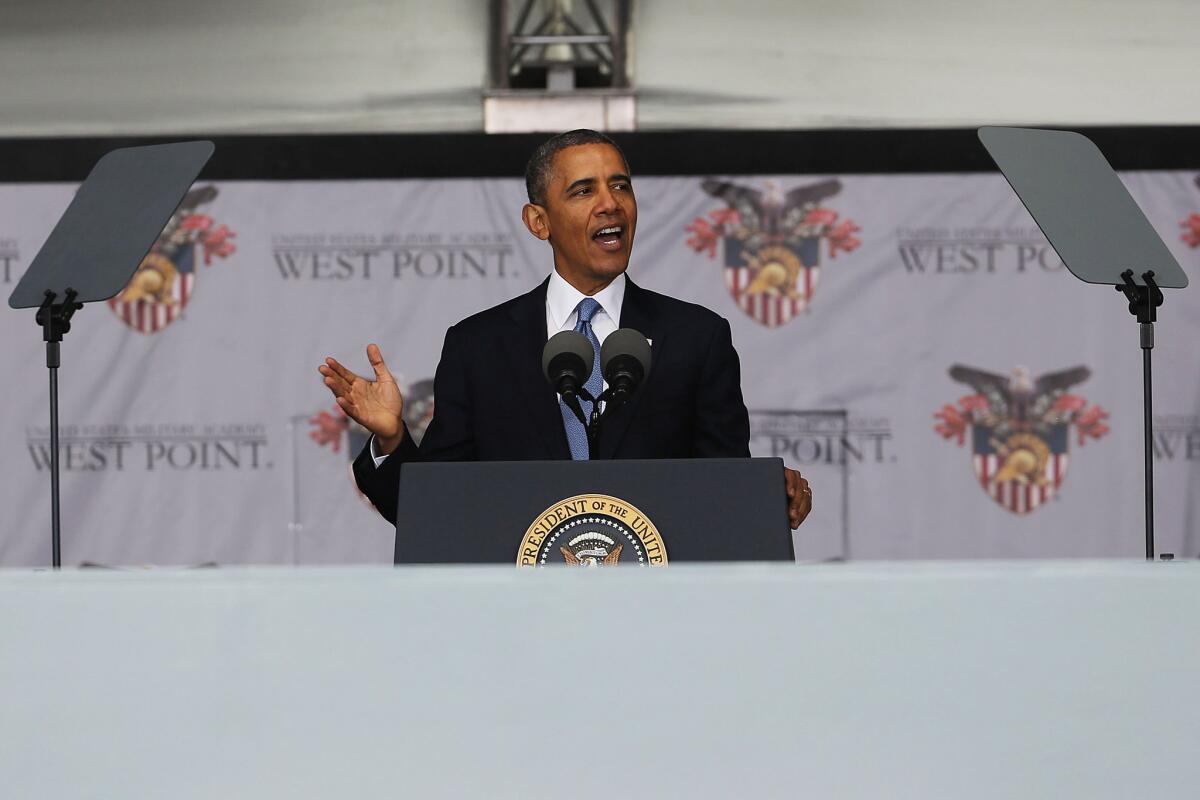Opinion: What Obama didn’t explain in his foreign policy speech at West Point

President Obama’s foreign policy speech at West Point on Wednesday didn’t break any new ground, not even rhetorically. But it wasn’t intended to. It was meant as a rebuttal, an answer to critics who have harried Obama for months complaining that America’s adversaries (Russia, China and Syria, for example) are pursuing their goals with more success than the United States has found in stopping them.
The criticisms have gotten under Obama’s skin. He gripes about them frequently, in public and in private. So, with a speech already promised for West Point’s graduation ceremony, he seized the opportunity for a longer, more considered version of his side of the argument.
His core message was familiar and entirely reasonable: The United States needs to remain engaged in the world but should not think of military intervention as its primary tool. “American isolationism is not an option,” he said. “The United States is the one indispensable nation,” the only country capable of organizing big multilateral coalitions to fix big international problems.
But then, alas, the president took aim at a whole battalion of straw men. “U.S. military action cannot be the only, or even primary, component of our leadership in every instance,” he said.
But no one has argued that military action should come first — not even George W. Bush, who took the nation to war in Iraq and Afghanistan.
“A strategy that involves invading every country that harbors terrorist networks is naive and unsustainable,” Obama said, knocking down another argument nobody has made.
The real questions are harder, but Obama mostly ducked those. The hawkish critics of his cautious policy in Syria, for example, never proposed putting U.S. troops on the ground; instead, they proposed setting up a no-fly zone and arming Syria’s moderate rebels. Obama initially rejected both ideas as reckless, but he has now belatedly embraced the second — a nuance he didn’t explain Wednesday.
The larger missing element was this: The fundamental challenge for any nation’s foreign policy consists in defining its most important interests — and then making sure its commitments match its resources. Obama was clear on the first part but not on the second.
The most immediate threat the United States faces, he said, remains terrorism. The war against Islamist extremists isn’t over; in some ways, it’s expanding.
But the president wasn’t as candid on the most difficult adjustment he’s proposing, and the one that keeps causing him political trouble: When the United States reduces the resources (military and otherwise) it devotes to foreign affairs, it needs to downsize its ambitions as well.
If you read between the lines, that’s an equation Obama accepts; unlike Bush, he’s not promising to end tyranny, only to oppose it.
He’d like to square the circle — to keep American leadership effective, at lower cost — by working with other countries as allies and partners. But that’s been the core of American diplomacy for a long time, and it’s never quite as easy as it sounds.
In a speech whose principal goal was rebutting charges of weakness, it’s probably too much to ask for a clear-eyed discussion of which foreign policy goals are achievable at a reasonable cost, and which aren’t. We may have to wait for Obama’s memoirs for that.
More to Read
A cure for the common opinion
Get thought-provoking perspectives with our weekly newsletter.
You may occasionally receive promotional content from the Los Angeles Times.







